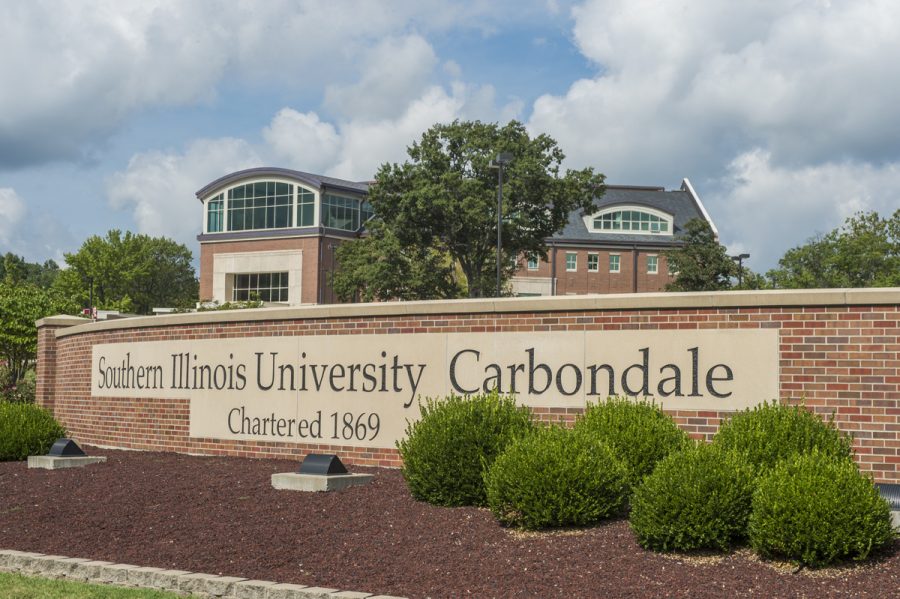Housing battles marijuana use
November 17, 1997
Smoking in the dorm room
Marijuana becoming the drug of choice in University Housing?
By Brett Wilcoxson, Daily Egyptian investigative reporter
Advertisement
(Editor’s note:This is the final installment of a three-part series exploring the prevalence of marijuana cultivation, sale and use in Carbondale. The previous stories can be found on-line at www.dailyegyptian.com).
The day before spring break began, Kim and two companions from her residence hall were kicking back, passing around a bong and sharing their vacation plans.
Then, a knock on the door later, a fourth person entered the room and the lives of the three friends. This unexpected intruder was a member of the University Housing staff.
Such incidents are not uncommon in SIUC residence halls. Since 1993, the number of people written up for marijuana violations has increased by more than 300 percent from 89 during the 1993-1994 school year, to 309 in the 1996-1997 year.
And Steve Kirk, assistant director of Residence Life, said these numbers seem to reflect an increase in the use of the drug in University Housing.
I think if we look at the experience that we have here in terms of what we’re filing reports on, I think very definitely marijuana use (in the residence halls) seems to be increasing, he said.
Kim, who considers herself knowledgeable about the signs of marijuana use, said use of the drug on the SIUC campus is commonplace.
Advertisement*
You can smoke pot anywhere (on campus), she said. I walk home through Thompson Woods every night and I can smell it over by the pavilions (by Campus Lake) and on the other side of campus (University Park). You walk around Saturday night coming home from a party, and you’ll see it and smell it going on.
She added that in her residence hall, the use of the marijuana is prevalent.
It’s just as common as people drinking, she said. And if you’ve ever lived in a dorm, you know that people are going to sit down and have a beer whenever they want to.
Barb Fijolek, wellness coordinator at the SIUC Wellness Center, said evidence based on voluntary surveys shows that the number of students nationwide who are at least experimenting with marijuana is on the rise.
College students overall are reporting more marijuana use than they did say five years ago, she said. And SIUC as a whole is pretty close to the nationals.
What is Housing doing to halt the marijuana use?
University Housing’s policy concerning marijuana is not designed to come down hard on those who are caught smoking for the first time.
I think we take the other drugs (hard drugs) much more seriously, Kirk said. The stance we’ve adopted is that if we catch you with just simple marijuana usage, we are going to sit down with you and talk about why we think that’s a problem.
If we went in and it smelled like marijuana and there’s half a joint in the ashtray, or there is a used pipe, we would confiscate that contraband. And we would turn that over to the police so that there’s a record that we didn’t keep it and do something with it that we shouldn’t. But we wouldn’t call the police to have that person arrested.
While Housing officials may not choose to have someone arrested, when police come to pick up the contraband, they have the option of doing so. Kirk said lately the police seem to be taking advantage of that option, and he believes that is one of the reasons for the increase in University Police drug arrests.
In the past they would say, OK, here’s your receipt. We got it. Thank you very much.’ And in the last year or two they’ve taken much more of a stance of saying, Who did you get this from? We want to go talk to them,’ Kirk said. And there have been a number of occasions where that has turned into the police questioning and even arresting a student.
While the Housing staff is willing to aid any attempts at law enforcement, Kirk said they do not enjoy seeing students arrested in the minor-use cases.
The staff are not looking for that kind of involvement, he said.
Because University Housing policy concerning marijuana has not changed in about 20 years, Kirk said he expects that the relatively new SIUC Police policy of regularly questioning and arresting students involved in marijuana use should lend more of a change in numbers.
I think that what you’re going to find is that their change is actually a lot more dramatic than ours, he said, because our mode of enforcement hasn’t changed for several years, and I think theirs has.
Kirk’s belief is supported by statistical evidence. University Police has seen its annual number of drug arrests rise by more than 1,000 percent over the past five years, from 10 in 1993 to 111 in 1996 the most among Illinois colleges. And about 90 percent of these cases are marijuana-related.
However, Department of Public Safety Director Sam Jordan said SIUC Police are not the only University employees approaching marijuana use differently.
Jordan said that prior to the past few years, there was not a lot of information given to officers by Housing staff following the incidents. He said Housing personnel are now better educated about information that needs to be gathered when marijuana offenses are being written-up.
It’s an educational process for both the Housing staff and the officers, he said.
Although the amount of use in residence halls is growing, Kirk said University Housing at this time has no plans to implement any new programs to combat it. He said Housing’s marijuana policy changes took place 20 years ago.
What action is the SIUC Police Department taking?
Jordan said a community policing policy the department has implemented over the past two years involving residence hall foot patrols by officers has contributed to the increase in marijuana-related arrests.
We want to be out of cars and be more approachable and more in view to the staff, the Housing staff, the faculty and the students, he said. You can see and hear a lot more on foot than you can inside a squad car.
Kirk said Housing chose to allow these walk-throughs in an attempt at creating a safer living environment for students, not necessarily to combat marijuana use.
We had an agreement with the Department of Public Safety for a number of years that they could come through what we call the more public areas the lobbies and the first floors they didn’t go up and walk on the floors routinely, he said. They approached us a couple of years ago and wanted to try this community policing’ approach to have more of a police presence upstairs in the buildings.
Kirk said that although Housing did agree to allow this increased officer presence, it did so with reservation.
I suppose our concern is that when a uniformed officer walks through the floor, then quite often the RA (resident adviser) has to explain to everybody why he was there, he said.
But Kirk said the policy generally has gone over well with Housing residents.
So far the feedback we have gotten has been positive, that people (students) feel better, he said, that it’s a safety kind of thing.
But while Housing has agreed in principle to the patrols, Kirk said it has received no set schedules for the inspections. Jordan said there is a reason for the lack of regularity.
It’s not a scheduled thing that happens at this particular time on this particular day, he said. We try to be consistently inconsistent so we don’t create a pattern that people can recognize.
SIUC Police Lt. Andrew Smith, who is in charge of officer scheduling, said the dormitory patrols are activities the officers take part in whenever they have the time.
It is the officer’s discretion, he said. We may be too busy [to do a walk-through], you just never know.
Traditional training of the Housing staff
Every August the Housing staff (professional and student) and University Police take part in what is called pre-service training. This is done before students are allowed to move into the residence halls.
The training includes a marijuana-awareness activity in which SIUC Police burn a sample of the drug. Kirk said this is done not only to teach the staff what to look for, but also to help them recognize the drug’s smell.
If somebody says, How do you know what you smelled?’ Then we don’t get into this Do you know what it smells like because you use it yourself?’ he said.
In addition to this groundwork training, Housing and SIUC Police also engage in in-service training that takes place throughout the school year. Kirk said this is done in seminar format, and is not necessarily drug-related. These sessions are hour or 90-minute long meetings in which general safety issues are examined.
The root of the issue
Kim said that when she came to SIUC she had only experimented with marijuana. But when she got here, the drug was so readily available that she started using it regularly, and she found she enjoyed it quite a bit.
You can get anything you want here (in the dorms) depending on how hard you look for it, she said.
Although she had been exposed to the drug while living at home in a suburb of Chicago, she did not feel she could use it back then.
It wasn’t something you could do at home, she said, because you would have to go home and be fried in front of your parents.
For Kim, the pressures of being a student and living in student Housing makes smoking marijuana a pleasurable escape from reality.
When you live in the dorms, you come home and throw your books down and you are still in the school environment, she said. You can’t get away from it at all. It’s kind of cool to just be stupid just for a little while.
What combative plans are in the works by Housing?
Kirk said Housing can only go so far in its attempt at limiting marijuana use in the residence halls.
You look at some settings where there are very high levels of control, and almost no privacy, like prison, and people are managing to get their hands on drugs in that setting, he said.
Instead of trying to stamp out the marijuana problem, Kirk said University Housing would rather try and limit the amount of damage that it does to the resident community.
First we’d like you not to do any harm to anybody else, and second not to do harm to yourself, he said.
Kirk said he is not merely referring to physical harm the drug can do to the bodies of all who inhale the smoke. He said he also is concerned about the academic and emotional damage that is done when marijuana users interrupt the lives of their fellow residents.
They can’t study, they can’t sleep, and the place is getting torn up so they don’t have a nice place to live, he said.
For this reason, Kirk said the goal of Housing is not to stop the activity, but to limit it.
[We consider] how much can we minimize that type of thing, he said, more than having some dream about eradicating the use of it.
Advertisement








